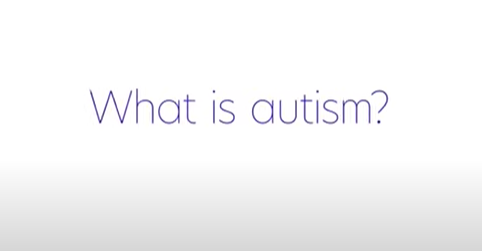Think you might be autistic?
Click the image to watch the video
Autism is a lifelong developmental disability which affects how people communicate and interact with the world. More than one in 100 people are on the autism spectrum and there are around 700,000 autistic adults and children in the UK.
(Taken from the National Autistic Society, Jan 2025. https://www.autism.org.uk/advice-and-guidance/what-is-autism)
Autism is a spectrum condition and affects people in different ways. Like all people, autistic people have their own strengths and weaknesses.
Social communication.
- taking things literally and not understanding abstract concepts
- needing extra time to process information or answer questions
- repeating what others say to them (this is called echolalia)
Social interaction
Autistic people often have difficulty 'reading' other people - recognising or understanding others' feelings and intentions - and expressing their own emotions. This can make it very hard to navigate the social world. Autistic people may:
- appear to be insensitive
- seek out time alone when overloaded by other people
- not seek comfort from other people
- appear to behave 'strangely' or in a way thought to be socially inappropriate
- find it hard to form friendships.
Repetitive and restrictive behaviour.
With its unwritten rules, the world can seem a very unpredictable and confusing place to autistic people. This is why they often prefer to have routines so that they know what is going to happen. They may want to travel the same way to and from school or work, wear the same clothes or eat exactly the same food for breakfast.
Over- or under-sensitivity to light, sound, taste or touch.
Autistic people may experience over- or under-sensitivity to sounds, touch, tastes, smells, light, colours, temperatures or pain. For example, they may find certain background sounds like music in a restaurant, which other people ignore or block out, unbearably loud or distracting. This can cause anxiety or even physical pain. Many autistic people prefer not to hug due to discomfort, which can be misinterpreted as being cold and aloof.
Many autistic people avoid everyday situations because of their sensitivity issues. Schools, workplaces and shopping centres can be particularly overwhelming and cause sensory overload.
Extreme Anxiety
Anxiety is a real difficulty for many autistic adults, particularly in social situations or when facing change. It can affect a person psychologically and physically and impact the quality of life for autistic people and their families.
(Taken from the National Autistic Society, Jan 2025. https://www.autism.org.uk/advice-and-guidance/what-is-autism)
Autism is a complex condition that can only be formally diagnosed by a specialist medical professional.
Autism screening is only available to current students of the University of Worcester.
STEP 1:
To help you understand what you are experiencing and to screen you for traits of autism, you should book a STAR appointment with the University’s Counselling and Mental Health Service.
STAR appointments can be booked here https://www2.worc.ac.uk/student-services/star.html
You might need more than one STAR appointment for the mental health professional to be able to identify traits of autism. The mental health professional you meet will let you know if they need to see you again.
STEP 2:
If the mental health professional identifies traits of autism, they will send a summary of their observations to the Disability and Dyslexia Service. We will contact you about booking an appointment with a Disability Adviser to discuss support that may be available to you and how to approach your GP to be referred for a formal autism assessment.
You can book an appointment with a Disability Adviser here https://www2.worc.ac.uk/disabilityanddyslexia/advisers.html
Get in touch
Email: disability@worc.ac.uk
Phone: 01905 855531
Book an appointment with a disability adviser.
We offer online appointments using Microsoft Teams or in person at firstpoint, Peirson Centre, St Johns Campus.
Appointments last a maximum of 45 minutes.

